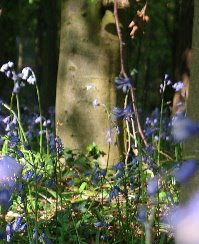 Coverage about global warming in UK tabloid newspapers has been significantly divergent from the scientific consensus that humans contribute to climate change. That's according to Max Boykoff and Maria Mansfield of the University of Oxford, UK, who studied newspapers from 2000 to 2006. Not really a surprise - and an issue I have covered before on this blog.
Coverage about global warming in UK tabloid newspapers has been significantly divergent from the scientific consensus that humans contribute to climate change. That's according to Max Boykoff and Maria Mansfield of the University of Oxford, UK, who studied newspapers from 2000 to 2006. Not really a surprise - and an issue I have covered before on this blog.Photos: Standish woods - bluebells are now over but they were as stunning as ever this year - I sadly didn't get out there as much as usual this year
Boykoff told environmentalresearchweb "We hope that this work will encourage tabloid newspapers to reflect further on the accuracy of their reporting on human contributions to climate change, particularly given their high readership in the UK publics. Contrarian comments in a column by Michael Hanlon in the Daily Mail or Jeremy Clarkson in The Sun may be off-the-cuff or playful at times, but they have a tremendous influence on how readership may understand climate change science and policy."
 The team found that the Daily Mail was more divergent from the scientific consensus than other tabloid newspapers. There were generally two main influences behind the tabloids' divergence. Boykoff said: "First was reliance on the journalistic norm of balance, where roughly equal attention was placed the view that humans contribute to climate change, and that our contribution is negligible. I had found this journalistic norm as influential in other earlier work on US newspaper and television coverage of anthropogenic climate change. And secondly, almost a third of the divergent coverage was attributed to 'contrarian' views that make claims that humans' role in climate change is negligible."
The team found that the Daily Mail was more divergent from the scientific consensus than other tabloid newspapers. There were generally two main influences behind the tabloids' divergence. Boykoff said: "First was reliance on the journalistic norm of balance, where roughly equal attention was placed the view that humans contribute to climate change, and that our contribution is negligible. I had found this journalistic norm as influential in other earlier work on US newspaper and television coverage of anthropogenic climate change. And secondly, almost a third of the divergent coverage was attributed to 'contrarian' views that make claims that humans' role in climate change is negligible."Tabloids have an important influence on public opinion in the UK as they have average daily circulations as much as ten times higher than many broadsheet newspapers. And readers of tabloids tend to come from different socio-economic backgrounds to broadsheet consumers, typically being more working class.
Many media workers interviewed for the study highlighted the political and economic constraints they face in reporting climate change. Boykoff said: "For example, with little specialist science training it was challenging to cover the intricacies of climate change while they were also covering a broad range of other news 'beats'. There remain few science and environment correspondents in the UK tabloid newspapers, and this has been a challenge for accurate climate change reporting."





No comments:
Post a Comment